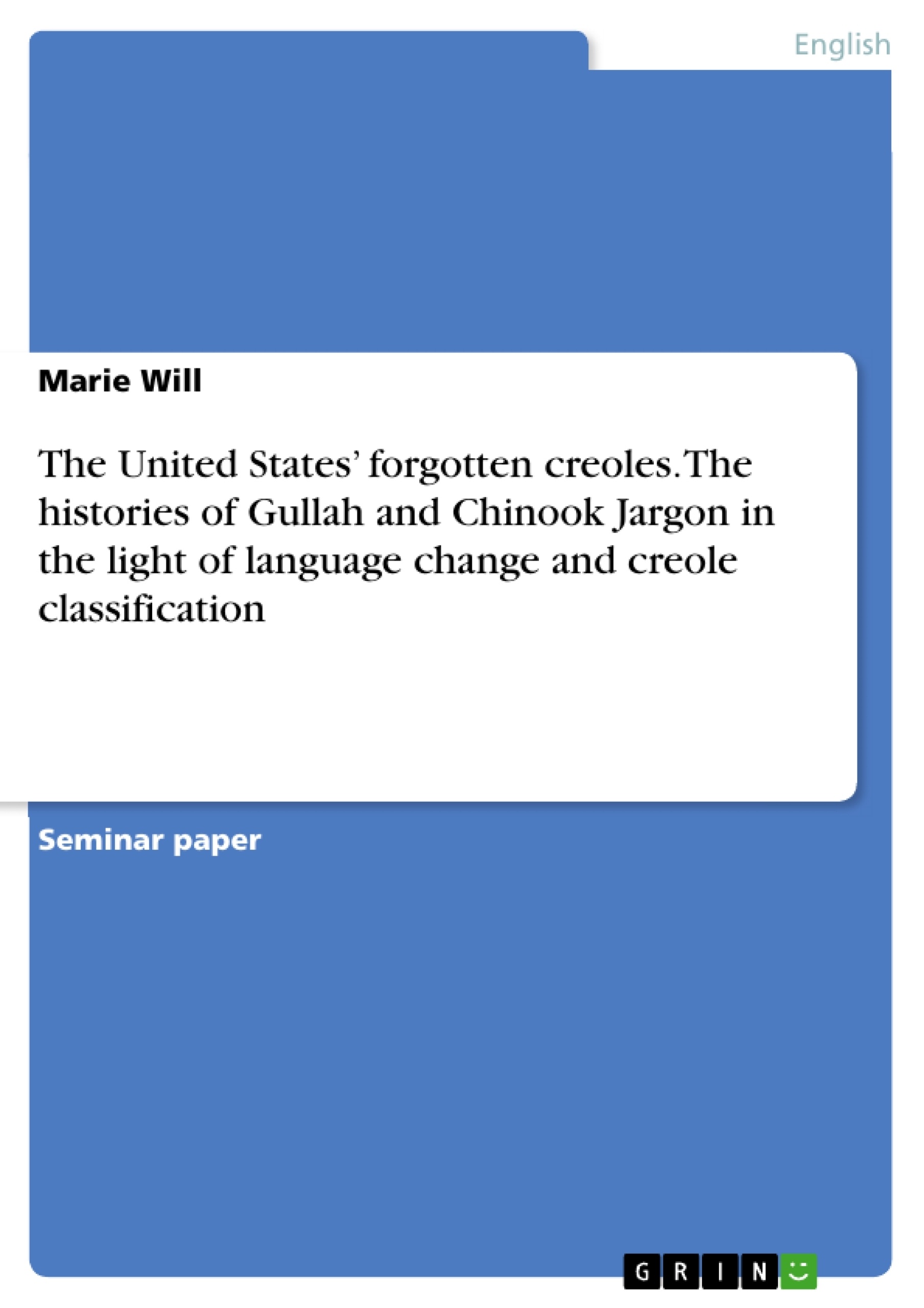This paper aims to explore the development of the creole languages Gullah and Chinook Jargon and the historical and cultural impact they had and continue to have on the communities in which they are spoken, as well as the overall linguistic diversity of the country which they are native to.
Creole languages are classified languages which develop out of a contact situation of two or more languages and are spoken natively by at least one generation. This sets them apart from pidgins, which develop similarly, but aren’t spoken natively. In the United States, there currently exist four language which are classified as creoles, however only two of them have enjoyed wide attention by linguists, as well as the public. Those are Louisiana Creole, which is based in French and spoken, as the name suggests, mainly in Louisiana, and Hawai’i Creole, which has its basis in English and is mainly spoken in Hawai’i. The other two have received much less attention, despite the fact that they are native to the country, classified as creoles and still spoken today. The first of the pair is Gullah, a creole which is based in English but carries strong influences from West and Central African languages and is spoken in North and South Carolina, Georgia, as well as Northeast Florida. The second language is Chinook Jargon, also known as Chinuk Wawa, a Native American based language, which is historically rooted in the times of the Westward expansion and is still spoken in Oregon today.
Inhaltsverzeichnis (Table of Contents)
- I Introduction
- II The development and classification of creole languages
- III The cultural impact and importance of creole languages
- IV A closer look at the often forgotten creoles of the United States
- IV.I Gullah
- IV.II Chinook Jargon
- V Conclusion
Zielsetzung und Themenschwerpunkte (Objectives and Key Themes)
This paper explores the development and historical and cultural impact of Gullah and Chinook Jargon, two often overlooked creole languages spoken in the United States. It aims to highlight their significance in shaping linguistic diversity and the communities in which they are spoken.
- The development and classification of creole languages
- The historical and cultural impact of creole languages
- The linguistic diversity of the United States
- The importance of understanding language change
- The challenges of language preservation and revitalization
Zusammenfassung der Kapitel (Chapter Summaries)
The first chapter introduces the concept of language change and the emergence of creole languages. It highlights the ongoing evolution of languages and the significance of studying creoles as examples of new language development.
The second chapter delves into the development and classification of creole languages, tracing their origins from contact situations and the interplay between lexifier and substrate languages. It explains the difference between pidgins and creoles and explores the process of creolization.
The third chapter discusses the cultural impact and importance of creole languages, emphasizing their role in shaping communities, preserving cultural heritage, and contributing to linguistic diversity.
Schlüsselwörter (Keywords)
Creole languages, Gullah, Chinook Jargon, language change, creolization, linguistic diversity, cultural impact, language preservation, pidgins, lexifier, substrate languages, contact languages.
Frequently Asked Questions
What are creole languages?
Creole languages develop from contact between two or more languages and are spoken as a native language by at least one generation.
How does Gullah differ from other US creoles?
Gullah is English-based but has strong influences from West and Central African languages, spoken primarily in the coastal Southeast US.
What is Chinook Jargon?
Also known as Chinuk Wawa, it is a Native American-based language rooted in the era of Westward expansion, still spoken in Oregon today.
What is the difference between a pidgin and a creole?
A pidgin is a simplified contact language with no native speakers, whereas a creole is a fully developed language learned by children as their first language.
Why are Gullah and Chinook Jargon called "forgotten" creoles?
Compared to Louisiana Creole or Hawai’i Creole, they have received significantly less attention from linguists and the general public.
- Quote paper
- Marie Will (Author), 2021, The United States’ forgotten creoles. The histories of Gullah and Chinook Jargon in the light of language change and creole classification, Munich, GRIN Verlag, https://www.hausarbeiten.de/document/1368679


